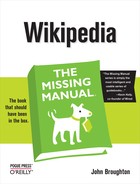If you’ve been reading your way steadily through this book, you probably already have a good sense that there are no absolute rules in a lot of Wikipedia areas. Groups of editors working together is one of those areas. Such activities can be much less formal than WikiProjects and ongoing, listed collaborations.
Wikipedia has a small number of organizations, several of which are mentioned in later chapters of this book. You can see the complete list via the shortcut CAT:ORG. For example, the Wikipedia Typo Department (shortcuts: WP:Typo and WP:Tyop), which began in November 2003, “aims to make Wikipedia look more professional by correcting typos and misspellings.” That organization has no formal members. Instead, a section of the organization’s main page contains pledges by a number of editors; for example, to fix all typos immediately.
Temporary, one-time, initiatives by a group of editors are even more informal than organizations. For example, in late August 2007, a proposal was posted at the Village Pump proposals page (shortcut: WP:VP/PR) to standardize the template messages that appear at the top of article pages. (These are templates indicating that the article needs cleanup, needs to be wikified, has its neutrality disputed, and so.) Within about a month, interested editors had agreed on and implemented changes to all the top-of-page article message templates (sometimes called amboxes), and the initiative was basically over. A remnant of it continues on in the form of the guideline Wikipedia:Article message boxes (shortcut WP:AMB), simply for maintenance and minor tweaks.
If you’re inclined to propose a new initiative, task force, working group, or similar project, whether a new organization or a temporary initiative, the Village Pump proposals page is a good place to start. Read the information at the top of the page, and then follow the link to the page of perennial proposals (shortcut: WP:PEREN); you won’t get much traction if you bring up something that experienced editors have seen several times before, or if you post to the wrong page. And also post to the talk pages of related instructional pages. For example, a discussion about template standardization occurred at a subpage of Wikipedia talk:Template messages before the first posting about the subject appeared at the Village Pump.
Finally, you can always create a subpage within your user space to start working on an initiative and trying to find other interested editors. In such a case, again, you can post to the talk (discussion) page of the relevant instructional page such as the page Wikipedia talk:Manual of Style, to see if anyone else is interested.
Note
Often, only a few editors read instructional talk pages, and a lot of ideas about change are floating around Wikipedia. Don’t take a lack of response as something personal. You can still find plenty of other things to do on Wikipedia.
